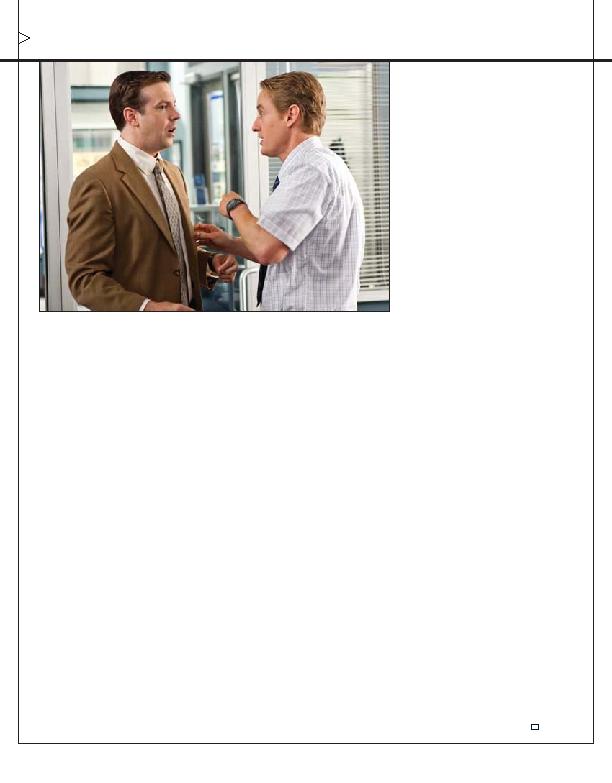
Pass, a comedy that tackles the question of:
What if your wife gave you one week to sleep
with anyone you wanted? "I know as a writer,
you're supposed to just write the best story
you can," he laughs. "I wrote the best story I
could, but made it a little happier than I orig-
inally planned. I have kids and I wanted to
make a sale."
Ben Affleck-produced reality show that
sought out new filmmaking talent, wrote
Pass on spec and his initial takes on the ma-
terial ended up a little dark. "I really enjoyed
the first draft and showed it to a couple of
friends," he explains. "They said to me,
`Jackass, you said you were hoping to write
a commercial script that would sell! This
isn't it.'" Luckily, Jones' lighter take turned
out to strike the right chord with the indus-
try. Before long there was a bidding war, but
Jones wanted his story in the right hands
with filmmakers he admired, so he chose
Peter and Bobby Farrelly, the writer-director
brothers behind There's Something About
Mary and Dumb and Dumber.
friend, writer Kevin Barnett. Barnett used to
work for the brothers as an assistant before
they discovered his talent as a writer and
brought him on board to co-write their 2007
film, The Heartbreak Kid. "Someone had slipped
Pete Farrelly one of my scripts," Barnett recalls.
"The next day, he asked if he could start rewrit-
ing it with me. They were the reason I went
out to Hollywood and really tried to pursue a
career in writing in the first place, so I'm still
not sure how this all happened."
began when he sent letters about job possi-
bilities to some of his favorite writers and di-
rectors working in Hollywood. The only
people to respond were the Farrellys, who
didn't have an opening at the time but prom-
ised to keep him in mind. Six months later,
he was working in their offices. Four years
later, he was their co-writer.
comedic territory that they were no longer
sure if audiences would like the main charac-
ters enough to buy into the story. "We real-
because the priority is getting the characters
right," Barnett says. "For Peter and Bobby, if
by page 10 or 15, you're not on board with
the lead character, then the movie is done."
trip that happened to take them into Moline,
Illinois -- just a few hours from Pete Jones'
house. The three planned to meet for dinner,
where the Farrellys confessed to Jones that
they were having trouble cracking his story. "I
told them it was already cracked," laughs
Jones, referring to his script. "They said, `We
really want to go for it, but will you come
back and help us?' After I said yes, they said,
`It starts tonight.'" The brothers roped Jones
into finishing the roadtrip with them all the
way to Washington, where the trio worked
on new ideas for the story.
this story is when you tell me it's two guys
who get a week off marriage, I know going
into the movie that it's two guys who get a
week off marriage. They do funny things and,
in the end, they realize they should stay mar-
ried. I want to rip that apart.' His big thing is:
Don't give the audience what they're expect-
ing, but leave them satisfied." They didn't
quite finish breaking the new story on the
drive, but Jones was officially brought on
board as a fourth co-writer and intense rewrit-
ing sessions took place at Peter Farrelly's farm-
house in Ojai, California.
board. The pages they were working on were
projected onto a big screen so that the other
three could see the same material. Working
chronologically from page one, the writers di-
agnosed what they deemed to be the prob-
lem areas from previous drafts and talked
them out together. "There's no set system in
place," Barnett says. "We just rewrite and
keep going until we feel good about it."
joined the Farrellys every day. After each
take, the writers gave their input -- some-
thing rare in Hollywood these days -- and
pages would be reworked each night as
needed. "We all had the same vision the en-
tire way through," Barnett explains, "but we
all had the freedom to change something up
if we felt strongly about it. Things can al-
ways get better." Jones agrees: "I had never
written with a team before," he says, "but
with them, the best idea wins."